|
9/10/2021 0 Comments NOMA Parent Coach TrainingIn 2020 our community gained 17 amazing Parent & Family Peer-to-Peer Coaches thanks to our recent intensive training by the addiction and recovery experts with Partnership for Drug-Free Kids and Center for Motivation and Change. We are so grateful to these individuals who stepped forward to learn more about helping others who are walking this path. We look forward to sharing the many ways they will be able to help our community. A BIG thank you to The National Children's Advocacy Center for the use of their beautiful Training Center and to Chuppertime Catering, Bigfoot Little Donuts, & The Lioce Group for their gracious donation of food for our coaches and trainers!
0 Comments
Not One More Alabama condemns the ongoing violence and discrimination against our black brothers and sisters. The cries of George Floyd, while under the knee of an officer sworn to protect him, have shaken us from stunned silence to a plan of action.
Our non-profit is made up of black, brown and white men and women who came together with first-hand experience of the devastating effects of addiction. We have shared intimate stories with one another yet, until now, we have avoided the uncomfortable subject of discrimination. We will no longer be silent about race discrimination and disproportionate access to addiction treatment. We know that addiction does not discriminate, and we know that treatment does. As an organization, we are coming together to create actionable plans to develop programming, provide financial support, give voice to the oppressed, and better understand the obstacles that minorities face. We will not stand by while others stand on our brothers and sisters. We vow to push forward until there is Not One More Alabama man, woman or child without equal access to addiction treatment. About a week or so ago, I picked up on something while talking to my son over the phone. His words were a little too clipped when he described the bad dream that he had the night before. He has been plagued with nightmares since childhood. He woke up that particular morning and thought he was in his old bedroom – the one where he spent countless nights wrestling with a real monster: addiction.
He said he didn’t want to get rid of the furniture without talking to me, since I had given it to him a few weeks ago. But the feeling he had that morning was one that he didn't think he could shake. You see, about two weeks before that day, my son returned home in a U-Haul truck and loaded his bedroom suite, some dishes and kitchen accessories, tables and chairs – items I had saved for him over the years. He pulled away that day to move into his first apartment. It was a day that we had looked forward to for many, many years. I actually took a video of him driving away. He honked the horn as he drove down our street. My husband and I watched proudly from our driveway and laughed at his gesture. It was a big deal. My son has been in and out of recovery for more than a decade. He just celebrated his one-year sobriety date and collected his one-year chip. THAT was a big deal. But I really couldn’t fully enjoy the occasion because my son has a long history of sabotaging momentous events. His fear of failure has led him to take control of his destiny, and well, fail on his own terms. It doesn’t make sense to someone who hasn’t loved someone struggling with anxiety, depression and a substance use disorder. I am immensely proud of the hard work that he has done to fight this monster. If available, I would display a bumper sticker on my car that read: "MY son just finished a year in recovery." He has worked toward this one-year mark for more than a decade. So, I tried my best to push down my building anxiety and enjoy the moment. Because this time was different. Fears that social isolation could cause former addicts to relapse - while soaring unemployment and anxiety is creating a 'perfect storm' for alcohol and drug abuse
By ANNIBEL GROSSMAN FOR DAILYMAIL.COM APRIL 13, 2020 Click here to read article on the DAILYMAIL website Devan Markiewicz was approaching her third year of sobriety when lockdown was announced in the small commuter town of East Norwalk, Connecticut, where she lives with her boyfriend. Like many other former drug and alcohol addicts in recovery, Devan was suddenly faced with losing the community and coping mechanisms that she relied on to stay sober. Having built up a regular schedule of face-to-face Alcoholics Anonymous meetings, Devan describes her fear that social distancing would take her back to the isolation that she felt when she was abusing alcohol and drugs. She tells DailyMail.com: 'Isolation is where my disease [of addiction] took me. Now it's like here we are again.'
Devan, 34, explains that people who are successful in beating addiction are those who stay connected. She adds: 'We like our routines, we like seeing people and we like a schedule because it keeps us safe. And so when you take this mandatory stay-at-home order you're literally creating a hot bed for this disease. 'You're isolated again, you're alone and and you feel like no one's going to know [if you drink].' Devan believes she has reached a stage when she can use the online tools available to maintain her sobriety and not face relapse, but she fears that others in the early stages of recovery might struggle. She says: 'I definitely think that this could push people over the edge. This disease is powerful. It's not extreme to say that it wants the person dead.' The Substance Abuse and Mental Health Services Administration (SAMHSA) revealed that it does expect to see a rise in substance misuse as a direct result of COVID 19. A SAMHSA spokesperson told DailyMail.com: 'The rises in anxiety and depressed being anticipated are also accompanied by an expected increase in substance misuse as people cope with loneliness, isolation and potential unemployment.' Samantha Arsenault, VP of National Treatment Quality Initiatives at national non-profit Shatterproof, explained how being isolated can affect a person struggling with addiction. She said: 'Having strong coping mechanisms and a sense of community is a protective factor against addiction. When that's challenged for people either in active addiction or the early stages of recovery - or even long-term recovery - it's going to increase the risk of relapse.' Dr Fred Muench, president of Center for Addiction, explained how this is a particularly delate situation for those in short-term recovery. 4/2/2020 4 Comments Relapse JustificationBy Jack Sykstus, LMFTUsing substances is very common. Our society is built on consumption. The amount of people I meet daily that want to change their relationship with alcohol, marijuana, or any form of consumption is significant. The problem doesn’t lie in desire. I wanted to go multiple days sober, engaging in my college classes, and make my parents proud. The problem lies in behavior change. How do I take my desires, good and bad, and turn them into a new, long term sustained behavior change? As a counselor, one of the most arduous requests I make to my clients is behavior change. It takes courage, bravery, and consistency to make a change in behavior and one of those many bumps in the road is relapse justification. Relapse justification is simple in theory. I am living a meaningful engaged life, and all of a sudden I have a simple, innocent thought: “oxycontin would be great right now.” Now my mind is moving a million miles per hour. “Well I don’t have money, well I do, but I won’t have enough for gas to get it, well I do have some weed I can sell, BUT WAIT, your parents will be mad, your fiancé would be devastated, you might lose your job due to this coronavirus BS, ahhh but a 30 mg blue roxy would be so refreshing and nice, and I mean I can figure all this out after I get it, we are quarantined because of Coronavirus so I am relaxing anyway, no one will know, honestly the past three weeks have been super stressful and I deserve to relax, can I hide it from the people I love, will one pill really set me back, I might not find enough to get addicted during coronavirus.” All of these thoughts happen in about a five-second period, then my brain selects just a few of those thoughts: It REALLY has been a stressful few weeks, aaanndd my parents drink alcohol, my brothers drink alcohol, what’s so different about me using an opiate? I am going to be sitting at home for days on end with nothing to do anyway. This process does not negate that I want my family to be proud of me, but my brain has now filtered out all the other noise and focused on two things, my stress over the past three weeks and how to cope with it. I just justified my relapse. With COVID-19, it has been a stressful few weeks, and our brains want us to relax and soothe which prompts us to change our behaviors! One strategy to combat relapse justification is called delaying the process. For example, I have been on a diet for a long time and I LOVE Wendy’s. I mean it is so good. My brain might say, “Jack, go get a Wendy’s burger, that is the dopest burger around.” I might get really excited and start feeling euphoric and thinking back to all the beautiful Wendy’s burgers I have had and I say YES, I will get one tomorrow. This strategy of delaying the process can help slow down the escalation of thoughts and allow the initial emotional surge to pass. Delaying is just one strategy to navigate relapse justification. Other strategies might include:
These are just a few strategies that can be used during these times. Reach out to local resources and support groups such as Not One More Alabama (NOMA) to identify other strategies and ways to get learn more strategies and ways to navigate substance use. This is a tough time in the world. Use your voice, share your concerns, and be kind to yourself, and to each other. 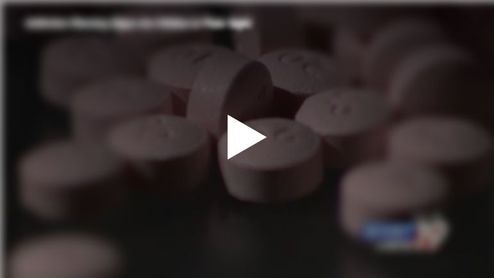 By Kelley Smith, Reporter WHNT TV 19 HUNTSVILLE, AL - August 10, 2018 - 115. This is the number of people who die from a drug overdose every day in the United States. Not One More Alabama (NOMA) is an organization that is working to raise awareness about this issue. It's working with parents to teach them warning signs which indicate their child might be using drugs. Addiction is a destructive force. "It's a disease. It's a chronic, progressive brain disease that if we don't do something about they end up either incarcerated or dead," NOMA Vice President Shannan Roberts said. The nonprofit organization works to help parents steer their children away from addiction by teaching them the warning signs. This is why they built the drug awareness discovery room. "There's a lot of signs that we can really miss. It will look like a normal teenager's bedroom and then all the sudden you're noticing things after you found out they've been using for a while and you're like "ah" that's what that was," Roberts said. The trailer is a replica of a teenager's bedroom. It shows how the signs of addiction often hide in plain sight. There are many things kids can use to hide drugs. For instance, a desk holds many examples of things parents should be aware of. "You will see when they're starting to shoot up. they're taking these little pieces off the ends of a q-tip," Roberts said. A container of mints? It might not be as innocent as it looks. "They have the Altoids can sitting here and these little Altoids, or they look like Altoids, could be any pill," Roberts said. The death toll related to overdose deaths continues to rise every year. But, NOMA says knowing these warning signs can help stop addiction before it starts and ultimately saves lives. The Drug Awareness Discovery Room will be on display at the End Heroin Huntsville walk. It takes place Saturday, August 18th. Visit Notonemorealabama.org for more information. Huntsville, AL - August 2, 1018 - The CARE Center recently announced a new NA meeting at Owens Cross Roads United Methodist Church located at 9177 U.S. Hwy 431 South. The first meeting is tonight at 6:30 and it is an Open Meeting. According to Jann Holden, Director of Operations at The CARE Center, this is the only NA meeting between Guntersville, Scottsboro and Huntsville. Rusty Bright is the point of contact for the meeting. Questions? Contact [email protected].
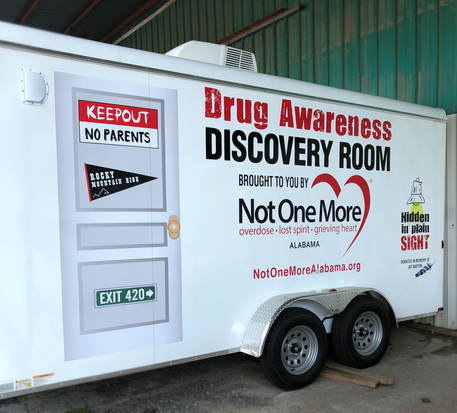 Huntsville, AL - July 2018 - Not One More Alabama (NOMA) is proud to announce the dedication of the new resource trailer, The Discovery Room, created to assist parents in the battle against drug use by their children. In a partnership with Leadership Huntsville Small Group, this trailer is designed to simulate a typical teenager’s bedroom. Parents will be invited into the trailer to “discover” some of the telltale signs of a child using and hiding drugs of all kinds. It demonstrates the need for parents to remain vigilant and aware of the everyday activities of their child. Small changes in their bedroom can be an indicator of serious changes in their behavior. This trailer is the result of months of coordination between Leadership Huntsville Small Group and NOMA along with generous donations from: Leadership Alabama, Torch Technologies, WHNT, Jeffrey’s Sign and Banner – Tom Jeffery, Sherwin Williams – Eric West, James Carpets – Scarlett King , Ed Gallup, The Saturday Morning Group, Greg Johnson and NOMA. The trailer is dedicated in loving memory to Jay Barton, a 2002 graduate of Huntsville High that lost his life on July 5, 2016 to addiction. Please contact NOMA at 256.384.5055 or email for more information on the trailer. Our region's largest group of orthopaedic specialists has taken the initiative to address the prescription drug abuse crisis by contributing to the mission of Not One More Alabama (NOMA) as one of its sponsors, and launching a campaign to educate patients about the dangers of prescription drug abuse. The Orthopaedic Center (TOC) recently set in motion the "Mind Your Meds" campaign by printing posters for waiting areas in its two Huntsville locations and other locations in Madison, Guntersville, Athens, Scottsboro and Fayetteville, TN plus its therapy clinics in surrounding communities. Posters like the one shown below have been printed by Colonial Printing in Huntsville (a contribution of another sponsor of NOMA) and will be posted at each TOC location. Each poster lists the closest "drop off site" for that particular location. This is the first of several campaigns that TOC has planned to address the opioid crisis. The first campaign coincidentally preempted today's announcement by U.S. Attorney General Jeff Sessions. Think of what we can do with coordinated campaigns among federal, state and local agencies! If you would like a poster for your business or school, please contact [email protected]. Download: Mind Your Meds poster
There is a lot of stigma and misunderstanding with substance use disorders, treatment and recovery. But you should never let social judgment stand in the way of getting your loved one the help he or she needs and deserves. #1 FACT: Substance use changes the brain, which can make drug use compulsive.
An adolescent may start out doing drugs occasionally or may be prescribed medicine by a doctor. Over time, continued use rewires the brain to compulsively seek substances, despite negative consequences. With opioids, a person may initially like the euphoria, but soon, the drug is needed just to feel “normal” and not get sick from withdrawal. #2 FACT: Expecting your child to “just quit” cold turkey is unrealistic. Changing substance use behavior is a process. In the beginning your child may not think there is a problem. Next, she may realize it is a problem, but feel conflicted about addressing it. Then she needs to figure out how to deal with it and take steps in a healthier direction, including getting professional help, changing friends, learning drug refusal skills and more. #3 FACT: Intervening early is more effective than waiting for “rock bottom.” Because behavior change is a process, instead of letting your son or daughter hit their lowest point, it’s important to help right away. And it is much easier to help when they are still engaged in school or work, have social supports and interested in sports or hobbies. In other words, they have structure, purpose and social connections — scaffolding needed for a good outcome. #4 FACT: Your child can be ambivalent about treatment and it can still be effective. While some welcome the opportunity for treatment, most will be conflicted about stopping their substance use. Studies show those who enter drug treatment programs as a result of loving pressure do comparatively better in treatment, regardless of the reason they sought treatment in the first place. #5 FACT: Relapse is common and represents a learning opportunity. Relapse doesn’t mean that treatment hasn’t worked. As with all chronic diseases, many people have one or more relapses before achieving long-lasting recovery. Relapses happen both when the person is doing well or when struggling, and can serve as a learning opportunity to identify what triggered the relapse — and to find ways to address it for the future. #6 FACT: Positive behavior and communication skills are more effective than punishment. Addiction is a brain disease and needs family support as with any other chronic illness. Shaming, detaching or punishing often backfires, with kids spiraling further into risky substance use and isolation. What does work is reinforcing positive behaviors, finding healthy activities that compete with your child’s use and letting him or her experience natural consequences. Coupled with empathy and compassion, this approach (known as CRAFT) is a scientifically-proven way to help parents change their child’s substance use. #7 FACT: Finding an effective approach for treatment can mean investigating different doctors or programs before finding a good “match.” The best programs give a screening and in-depth assessment of your child by a qualified professional versed in addiction and mental health. They will develop an individual treatment plan and combine methods tailored to address your child’s specific needs. But don’t be discouraged if the first program you investigate is not a good fit — keep exploring other options. #8 FACT: Medication-assisted treatment, coupled with counseling, is the preferred treatment for heroin and other opioids. Taking medication for an opioid addiction is like taking medication for any other chronic disease, like diabetes or asthma. Numerous studies have shown that medications can reduce cravings, relapses and overdoses when taken as prescribed. #9 FACT: Many people struggling with substance use require longer-term and/or repeated treatment. Because a drug problem can include relapses, going through treatment once may not be sufficient to keep your child drug free. Each treatment episode allows them to be abstinent for a period of time while learning new coping skills but it may take time. Know the treatment options available so that you can make the best choice for your child’s path to recovery. |
Not One More - AlabamaA group of people damaged but not destroyed by addiction. We are fighting this battle together. Archives
September 2021
Categories |
Email Us at [email protected]
Or leave a message at: 256-384-5055

Not One More Alabama is proud to be a Community Partner with The Partnership to End Addiction , an organization that provides personalized support and resources to families impacted by addiction, while mobilizing policymakers, researchers and health care professionals to more effectively address addiction systemically on a national scale.
Not One More Alabama is a not-for-profit 501(c)(3) organization. Donations may be tax-deductible.
Our federal tax ID number is 61-1807663
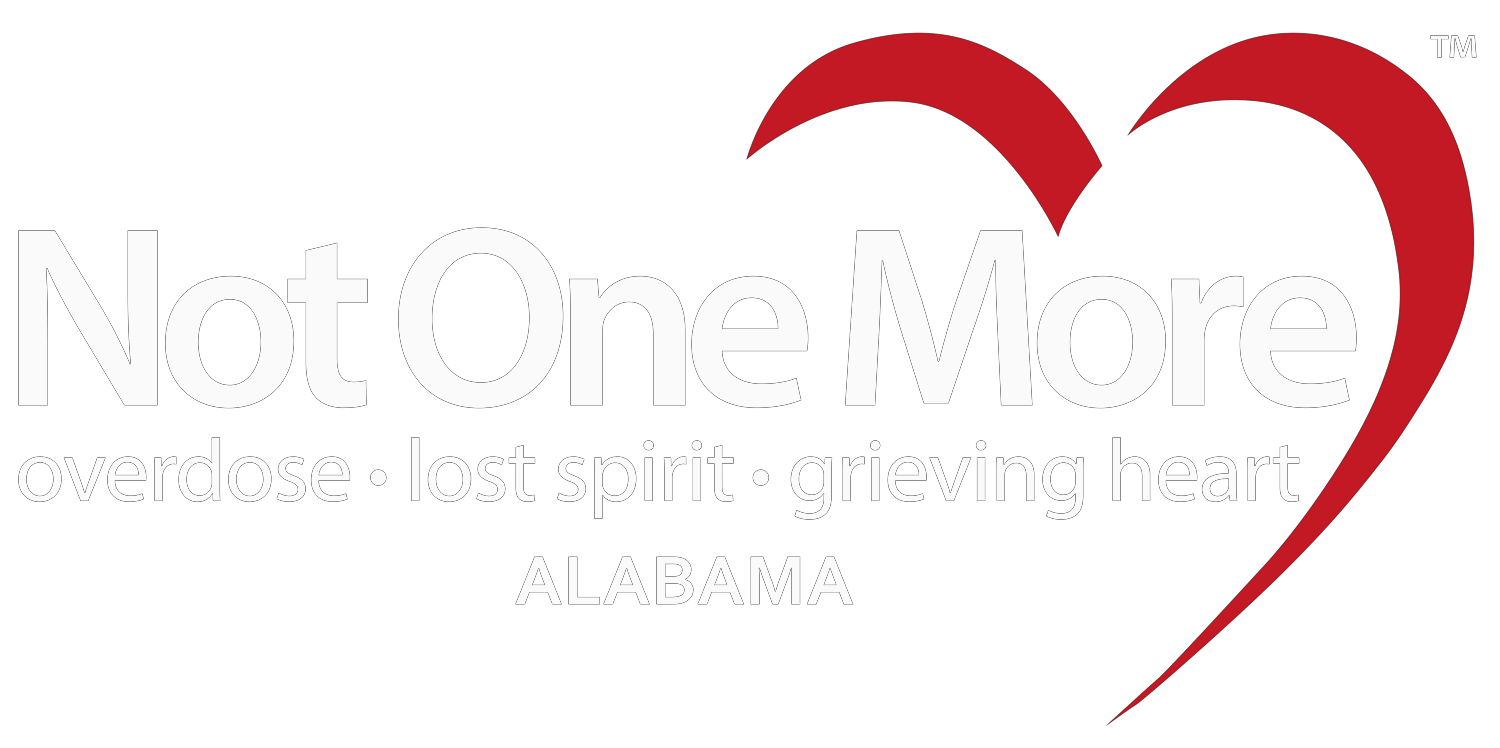
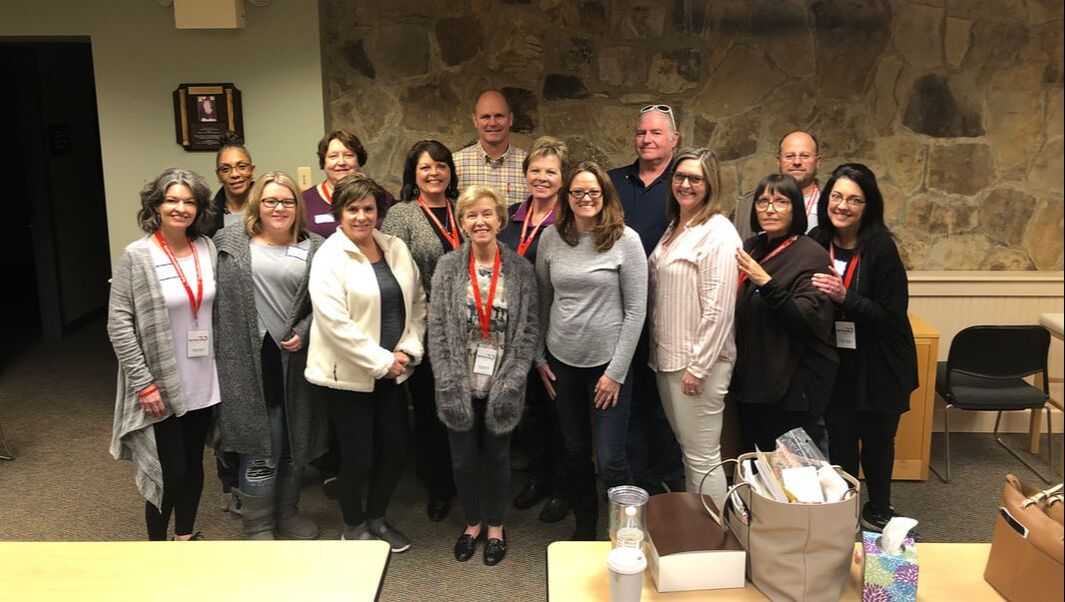




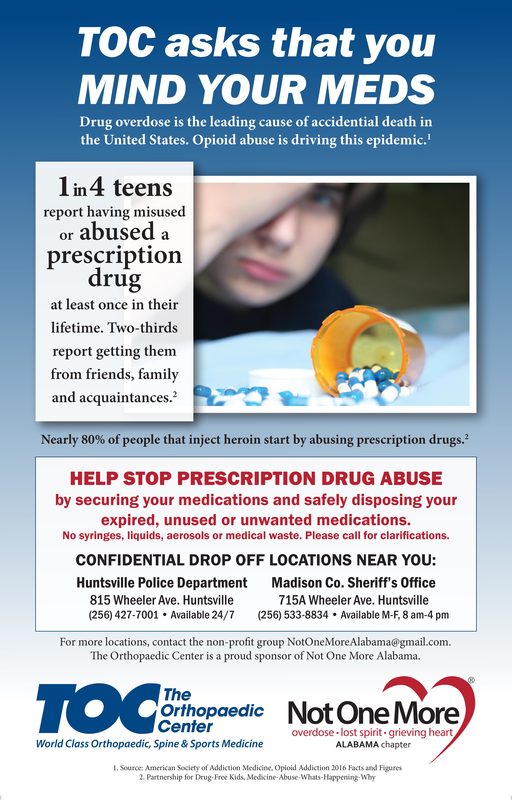
 RSS Feed
RSS Feed
